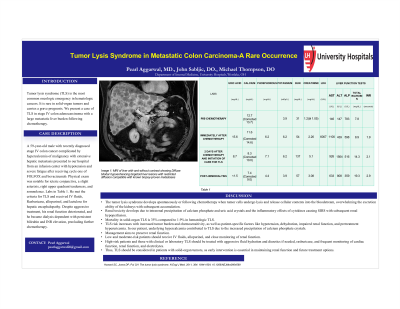Tuesday Poster Session
Category: Colon
P3092 - Tumor Lysis Syndrome in Metastatic Colon Carcinoma - A Rare Occurrence
Tuesday, October 24, 2023
10:30 AM - 4:00 PM PT
Location: Exhibit Hall

Has Audio

Pearl Aggarwal, MD
University Hospitals St. John Medical Center
Westlake, OH
Presenting Author(s)
Pearl Aggarwal, MD, John Sabljic, DO, Michael Thompson, DO
University Hospitals St. John Medical Center, Westlake, OH
Introduction: Tumor lysis syndrome (TLS) is the most common oncologic emergency in hematologic cancers. It is rare in solid-organ tumors and carries a grave prognosis. We present a case of TLS in stage IV colon adenocarcinoma with a large metastatic liver burden following chemotherapy.
Case Description/Methods: A 59-year-old male with recently diagnosed stage IV colon cancer complicated by hypercalcemia of malignancy with extensive hepatic metastasis presented to our hospital from an infusion center with hypotension and severe fatigue after receiving cycle one of FOLFOX and bevacizumab. Physical exam was notable for icteric conjunctiva, a slight asterixis, right upper quadrant tenderness, and somnolence. Labs in Table 1. He met the criteria for TLS and received IV fluids, rasburicase, allopurinol, and lactulose for hepatic encephalopathy. Despite aggressive treatment, his renal function deteriorated, and he became dialysis dependent with persistent bilirubin and INR elevation, precluding further chemotherapy.
Discussion: The tumor lysis syndrome develops spontaneously or following chemotherapy when tumor cells undergo lysis and release cellular contents into the bloodstream overwhelming the excretion ability of the kidneys with subsequent accumulation. Renal toxicity develops due to intrarenal precipitation of calcium phosphate and uric acid crystals and the inflammatory effects of cytokines causing SIRS with subsequent renal hypoperfusion.
Mortality in solid-organ TLS is 35% compared to 1.9% in hematologic TLS. TLS risk increases with increased tumor burden and chemosensitivity, as well as patient-specific factors like hypotension, dehydration, impaired renal function, and pretreatment hyperuricemia. In our patient, underlying hypercalcemia contributed to TLS due to the increased precipitation of calcium phosphate crystals.
Management aims to preserve renal function. Low and moderate-risk patients should receive IV fluids, allopurinol, and close monitoring of renal function. High-risk patients and those with clinical or laboratory TLS should be treated with aggressive fluid hydration and diuretics if needed, rasburicase, and frequent monitoring of cardiac function, renal function, and electrolytes.
Thus, TLS should be considered in patients with solid-organ tumors, as early intervention is essential in maintaining renal function and future treatment options.
Howard SC, Jones DP, Pui CH: The tumor lysis syndrome. N Engl J Med. 2011, 364: 1844-1854. 10.1056/NEJMra0904569

Disclosures:
Pearl Aggarwal, MD, John Sabljic, DO, Michael Thompson, DO. P3092 - Tumor Lysis Syndrome in Metastatic Colon Carcinoma - A Rare Occurrence, ACG 2023 Annual Scientific Meeting Abstracts. Vancouver, BC, Canada: American College of Gastroenterology.
University Hospitals St. John Medical Center, Westlake, OH
Introduction: Tumor lysis syndrome (TLS) is the most common oncologic emergency in hematologic cancers. It is rare in solid-organ tumors and carries a grave prognosis. We present a case of TLS in stage IV colon adenocarcinoma with a large metastatic liver burden following chemotherapy.
Case Description/Methods: A 59-year-old male with recently diagnosed stage IV colon cancer complicated by hypercalcemia of malignancy with extensive hepatic metastasis presented to our hospital from an infusion center with hypotension and severe fatigue after receiving cycle one of FOLFOX and bevacizumab. Physical exam was notable for icteric conjunctiva, a slight asterixis, right upper quadrant tenderness, and somnolence. Labs in Table 1. He met the criteria for TLS and received IV fluids, rasburicase, allopurinol, and lactulose for hepatic encephalopathy. Despite aggressive treatment, his renal function deteriorated, and he became dialysis dependent with persistent bilirubin and INR elevation, precluding further chemotherapy.
Discussion: The tumor lysis syndrome develops spontaneously or following chemotherapy when tumor cells undergo lysis and release cellular contents into the bloodstream overwhelming the excretion ability of the kidneys with subsequent accumulation. Renal toxicity develops due to intrarenal precipitation of calcium phosphate and uric acid crystals and the inflammatory effects of cytokines causing SIRS with subsequent renal hypoperfusion.
Mortality in solid-organ TLS is 35% compared to 1.9% in hematologic TLS. TLS risk increases with increased tumor burden and chemosensitivity, as well as patient-specific factors like hypotension, dehydration, impaired renal function, and pretreatment hyperuricemia. In our patient, underlying hypercalcemia contributed to TLS due to the increased precipitation of calcium phosphate crystals.
Management aims to preserve renal function. Low and moderate-risk patients should receive IV fluids, allopurinol, and close monitoring of renal function. High-risk patients and those with clinical or laboratory TLS should be treated with aggressive fluid hydration and diuretics if needed, rasburicase, and frequent monitoring of cardiac function, renal function, and electrolytes.
Thus, TLS should be considered in patients with solid-organ tumors, as early intervention is essential in maintaining renal function and future treatment options.
Howard SC, Jones DP, Pui CH: The tumor lysis syndrome. N Engl J Med. 2011, 364: 1844-1854. 10.1056/NEJMra0904569

Figure: Image 1: MRI of the liver with and without contrast showing Diffuse bilobar hypoenhancing targetoid liver lesions with restricted diffusion compatible with known biopsy-proven metastases
Disclosures:
Pearl Aggarwal indicated no relevant financial relationships.
John Sabljic indicated no relevant financial relationships.
Michael Thompson indicated no relevant financial relationships.
Pearl Aggarwal, MD, John Sabljic, DO, Michael Thompson, DO. P3092 - Tumor Lysis Syndrome in Metastatic Colon Carcinoma - A Rare Occurrence, ACG 2023 Annual Scientific Meeting Abstracts. Vancouver, BC, Canada: American College of Gastroenterology.
